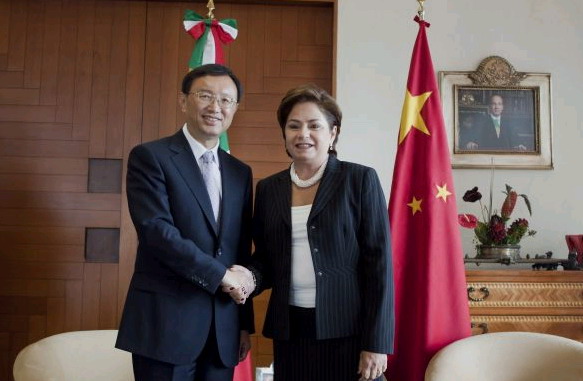Foreign and Military Affairs
World moving toward balance of power: Chinese FM
(Xinhua)
Updated: 2010-07-31 20:36
 |
Large Medium Small |
|
|
MEXICO CITY - Chinese Foreign Minister Yang Jiechi on Friday said he disagreed with the theory that world power is shifting from West to East.
Speaking at a joint press conference with his Mexican counterpart Patricia Espinoza, Yang said the world is witnessing a trend that various forces are moving toward a relative balance of power.
The process toward a multipolar world not only involves the rapid development of newly-emerging major developing countries, but also the strengthening of many developing countries as regional powers. This is evident in Asia, Africa and Latin America, Yang said.
The developing countries and groups composed of these countries have become a force to be reckoned with in world arena, just like their counterparts in the developed world, the Chinese foreign minister said.
The democratization of international relations is the common aspiration of the people the world over. It is also the requirement and one of the practical outcome of the ongoing multipolarization and globalization process, Yang said, citing the Group of 20 and its growth as an example.
The world countries should rise up to the complicated global challenges and tackle, through consultation, major global issues that bear on world peace and development rather than let a few countries have the final say because the fundamental interest of all countries are at stake. All countries should enhance dialogue and cooperation to achieve a mutually beneficial and win-win outcome, the minister said.
An outstanding problem at present is that many developing countries' reasonable stands and legitimate demands do not receive due respect and attention, he said, urging the developing countries to strengthen unity and strive for equal say and representation in international organizations and equal rights in international community.
This is a protracted and arduous process, yet an inevitable trend of the historical development, he said.
To safeguard and boost the common interests of developing countries and the fundamental interests of all peoples, China will actively promote South-South cooperation and South-North dialogue and push the international political and economic order forward in a more just and fairer way, he said.
On the same day, Yang and Espinoza attended the closing session of a two-day meeting of the China-Mexico Permanent Binational Commission, a high-level platform for the two countries to discuss cooperation in various fields.
The two sides agreed to continue their dialogue and cooperation in bilateral and multilateral fields to further deepen the strategic partnership between China and Mexico. The two countries also signed the Common Action Plan for 2011-2015 and other documents.
Mexico is the second leg of Yang's four-nation tour, which will also take him to Cuba and Costa Rica. His first stop was Austria.












